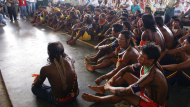Organization of American States Requests Immediate suspension of Belo Monte Dam in the Brazilian amazon
Astrid Puentes, Co-Director AIDA +1 (202) 294-3285
Andressa Caldas, Director Justiça Global +55 (21) 8187-0794
Roberta Amanajás, Lawyer SDDH +55 (91) 8162-1232
Marco Apolo, President SDDH +55 (91) 8156-0860
Caroline Bennett, Amazon Watch +1 (415) 487-9600
Astrid Puentes, Co-Director AIDA +1 (202) 294-3285
Andressa Caldas, Director Justiça Global +55 (21) 8187-0794
Roberta Amanajás, Lawyer SDDH +55 (91) 8162-1232
Marco Apolo, President SDDH +55 (91) 8156-0860
Caroline Bennett, Amazon Watch +1 (415) 487-9600
The Inter-American Commission on Human Rights (IACHR), part of the Organization of American States (OAS), has officially requested the Brazilian government immediately suspend the Belo Monte Dam complex in the Amazonian state of Para, citing the project's potential harm to the rights of traditional communities living within the Xingu river basin. According to the IACHR, the Brazilian government must comply with legal obligations to undertake a consultation process that is "free, prior, informed, of good faith and culturally appropriate" with indigenous peoples threatened by the project before further work can proceed. The Brazilian Ministry of Foreign Affairs must inform the OAS within fifteen days regarding urgent measures undertaken to comply with the Commission's resolution.
The IACHR's decision responds to a complaint submitted in November 2010 on behalf of local, traditional communities of the Xingu river basin. The complaint was presented by the Xingu Alive Forever Movement (MXVPS), the Coordination of Indigenous Organizations in the Brazilian Amazon (COIAB), the Prelacy of the Roman Catholic Church in the Xingu region, the Indigenous Missionary Council (CIMI), the Pará Society for the Defense of Human Rights (SDDH), Global Justice and the Inter-American Association for Environmental Defense (AIDA). According to the complaint, there were no appropriate consultations with affected indigenous and riverine communities regarding the impacts of the mega-dam project. The document argues that the dam would cause irreversible social and environmental damage, including forced displacement of communities, while threatening one of the Amazon's most valuable areas for biodiversity conservation.
"By recognizing the rights of indigenous people to prior and informed consultations, the IACHR is requesting that the Brazilian government stop the licensing and construction of the Belo Monte Dam project to ensure their right to decide," said Roberta Amanajas, SDDH lawyer. "Continuing this project without proper consultations would constitute a violation of international law. In that case, the Brazilian government would be internationally liable for the negative impacts caused by the dam."
The IACHR also requests Brazil to adopt "vigorous and comprehensive measures" to protect the lives and personal integrity of isolated indigenous peoples in the Xingu river basin, as well as effective measures to prevent the spread of diseases and epidemics among traditional communities threatened by the project.
"The IACHR's decision sends a clear message that the Brazilian government's unilateral decisions to promote economic growth at any cost are a violation of our country's laws and the human rights of local traditional communities," said Antonia Melo, MXVPS coordinator. "Our leaders no longer can use economic "development" as an excuse to ignore human rights and to push for projects of destruction and death to our natural heritage and to the peoples of Amazon, as is the case of Belo Monte."
"The OAS's decision is a warning to the federal government and a call to Brazilian society to broadly discuss the highly authoritarian and predatory development model being implemented in this country," said Andressa Caldas, Global Justice director. Caldas recalls examples of human rights violations caused by other infrastructure projects within the PAC, the federal government's "Accelerated Growth Program." "There are numerous cases involving the forced displacement of families without compensation, as well as serious environmental impacts, social disruption of communities, rising violence in areas surrounding construction sites and poor working conditions."
Criticism of the Belo Monte dam comes not only from civil society organizations, and local communities, but also from scientists, researchers, and government institutions. The Federal Public Prosecutor's office in Pará state has already filed ten civil lawsuits against the mega-project that are still awaiting final decisions.
"I am very moved by this news," said Sheyla Juruna, an Indigenous leader of the Juruna community in Altamira. "Today, more than ever, I am sure that we were right to expose the Brazilian government - including the federal judicial system - for violations of the rights of indigenous peoples in the Xingu and of all those who are fighting together to protect life and a healthy environment. We will maintain our firm resistance against the implementation of the Belo Monte Dam complex."
The IACHR's decision is founded on international law established by the American Convention on Human Rights, Convention 169 of the International Labour Organisation (ILO), the United Nations Declaration on Indigenous Rights (UNDRIP), and the UN Convention on Biological Diversity (CBD), as well as the Brazilian Constitution itself.

